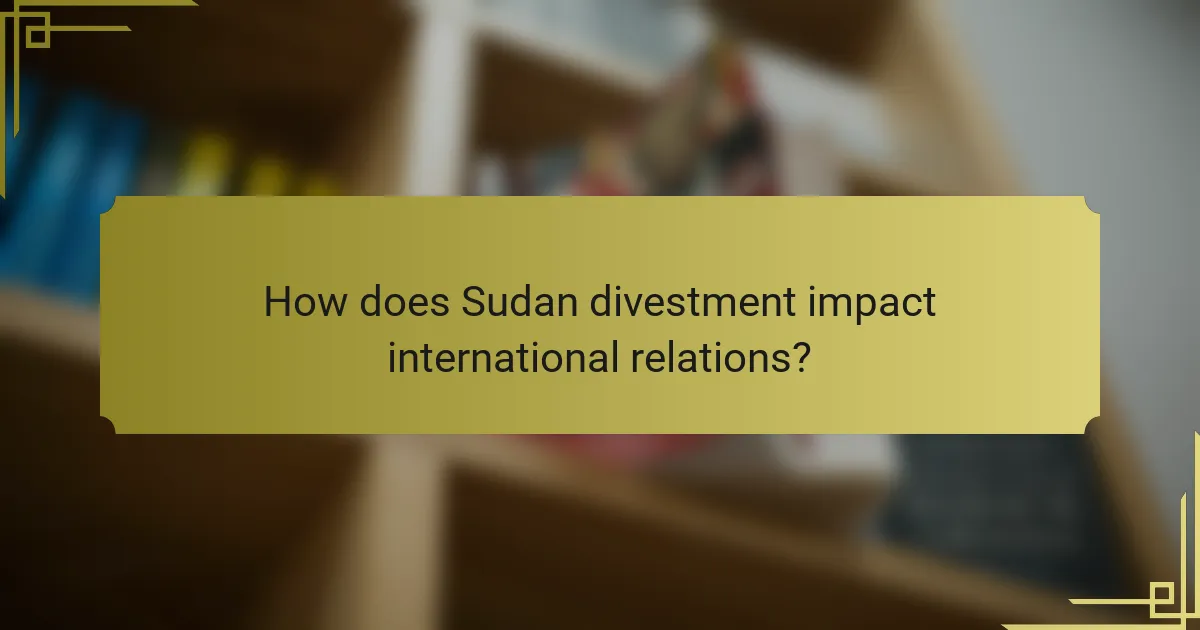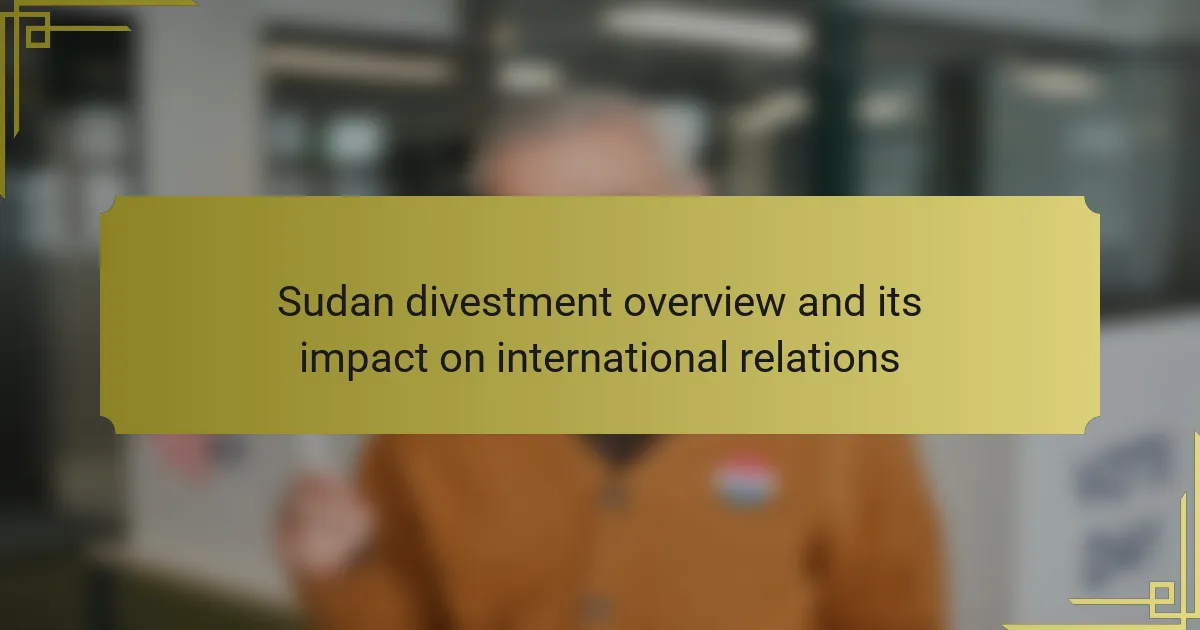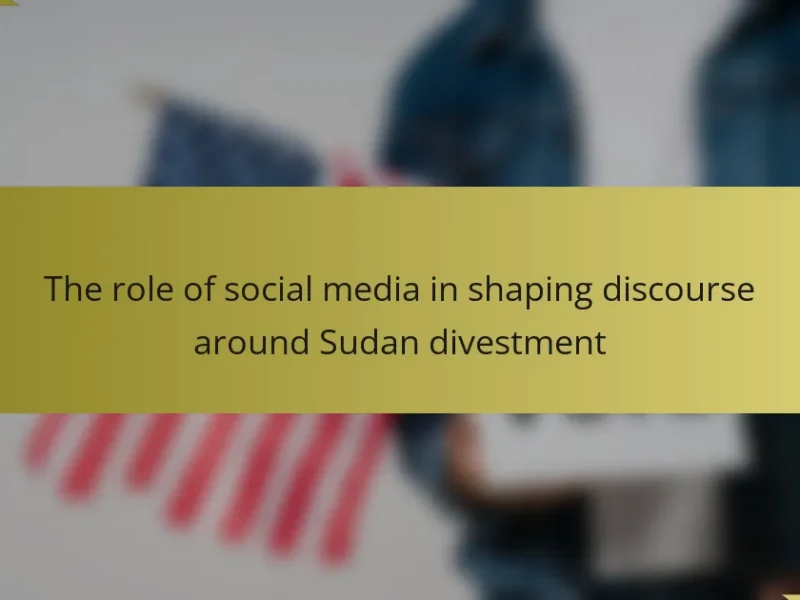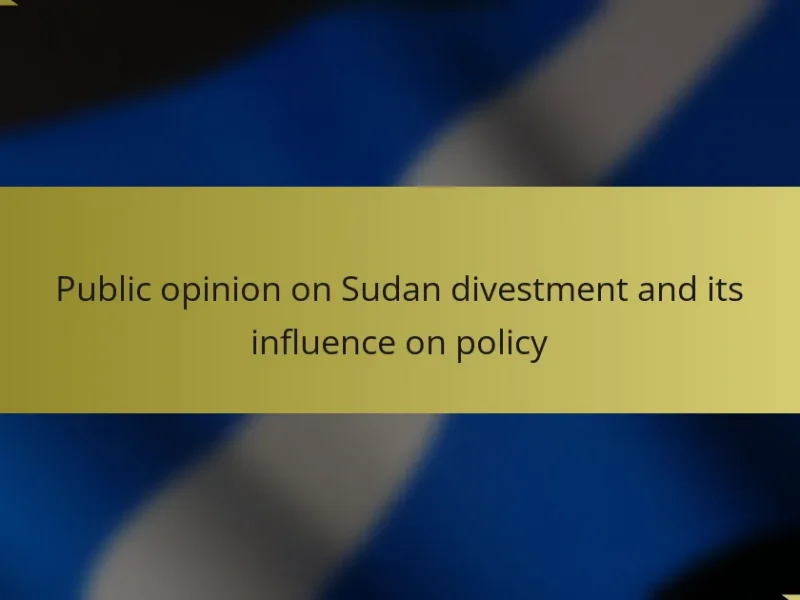Sudan divestment refers to the withdrawal of investments from companies operating in Sudan, driven primarily by concerns over human rights violations and ongoing conflict in the region. This action, taken by various organizations and governments, aims to pressure the Sudanese government and promote change by limiting financial support to entities associated with oppressive regimes. The article explores how Sudan divestment impacts international relations, signaling disapproval of government policies and potentially leading to economic isolation. It also addresses the challenges and criticisms associated with divestment, including its effectiveness, economic consequences for local communities, and the lack of clear metrics to measure success. Overall, the discussion highlights the complexities of using divestment as a tool for advocacy and international leverage.

What is Sudan divestment?
Sudan divestment refers to the withdrawal of investments from companies operating in Sudan. This action is primarily driven by concerns over human rights violations and conflict in the region. Various organizations and governments have enacted divestment policies to pressure the Sudanese government. The aim is to promote change by limiting financial support to entities linked to oppressive regimes. Notably, the U.S. enacted sanctions in the early 2000s, which included divestment measures. These measures were intended to hold the government accountable for its actions in Darfur and other areas. Divestment has been a tool for advocacy groups to raise awareness and influence international relations regarding Sudan.
Why is divestment important in the context of Sudan?
Divestment is important in the context of Sudan because it serves as a tool to pressure the government regarding human rights violations. The Sudanese government has been implicated in serious abuses, including the Darfur genocide. Divestment actions signal disapproval from international investors and can lead to economic consequences. For example, when major companies withdraw investments, it limits the government’s financial resources. This can potentially influence policy changes in favor of human rights. Additionally, divestment can mobilize public awareness and support for humanitarian efforts. Historical instances show that economic pressure can lead to significant political changes. Overall, divestment acts as a catalyst for accountability in Sudan.
What historical events led to the call for divestment from Sudan?
The call for divestment from Sudan was primarily driven by the Darfur conflict, which began in 2003. The Sudanese government’s actions during this conflict included widespread violence against civilians. Reports indicated that over 300,000 people were killed and millions displaced. International awareness of these atrocities increased significantly. In response, various organizations and governments began advocating for economic sanctions. The U.S. government labeled the actions in Darfur as genocide in 2004. This designation spurred divestment campaigns targeting companies doing business with the Sudanese government. Activists argued that divestment would pressure Sudan to cease its violent practices. These historical events collectively fueled the movement for divestment from Sudan.
How does divestment relate to human rights issues in Sudan?
Divestment relates to human rights issues in Sudan by serving as a tool to pressure the government for reform. Many companies have withdrawn investments due to the Sudanese government’s involvement in human rights abuses. This includes violence against civilians and suppression of political dissent. Organizations like the Sudan Divestment Task Force advocate for divestment to highlight these abuses. Research shows that divestment can impact the financial stability of regimes implicated in human rights violations. For instance, the withdrawal of funds can lead to reduced resources for oppressive actions. Therefore, divestment is viewed as a strategic move to promote human rights in Sudan.
What are the primary objectives of Sudan divestment?
The primary objectives of Sudan divestment are to pressure the Sudanese government to change its policies and to promote human rights. Divestment aims to reduce financial support for regimes involved in human rights abuses. It seeks to raise awareness about the situation in Sudan among investors and the global community. By withdrawing investments, advocates hope to influence political change. Historical instances show that divestment can lead to significant economic consequences for targeted governments. For example, divestment movements have previously succeeded in South Africa during apartheid. These actions are intended to align financial practices with ethical standards. Overall, the goal is to encourage a peaceful resolution to conflicts in Sudan.
How does divestment aim to influence government policies in Sudan?
Divestment aims to influence government policies in Sudan by withdrawing financial support from entities that contribute to human rights abuses. This strategy creates economic pressure on the Sudanese government. When investors divest, it signals disapproval of the government’s actions. Reduced funding can limit the government’s resources for oppressive activities. Historical examples show that divestment has led to policy changes in other countries. For instance, divestment in South Africa helped end apartheid. Thus, divestment serves as a tool for promoting accountability and encouraging reform in Sudan.
What role do international organizations play in Sudan divestment efforts?
International organizations play a critical role in Sudan divestment efforts. They facilitate the coordination of financial and political pressure against the Sudanese government. Organizations such as the United Nations and the African Union advocate for sanctions and divestment strategies. They provide frameworks for member states to implement these strategies effectively. Reports from these organizations often highlight human rights abuses in Sudan. This information drives global awareness and mobilizes action. Additionally, they engage with non-governmental organizations to amplify their efforts. Their involvement is crucial for maintaining international focus on Sudan’s situation.

How does Sudan divestment impact international relations?
Sudan divestment significantly impacts international relations by altering diplomatic and economic ties. When countries or organizations divest from Sudan, it often signals disapproval of its government policies or human rights violations. This action can lead to increased isolation of Sudan on the global stage. As a result, foreign investments may decline, affecting Sudan’s economy. Countries that divest may strengthen relationships with other nations advocating for human rights. Additionally, divestment can influence international policy discussions regarding sanctions and humanitarian aid. Historical examples include the divestment movements during the Darfur conflict, which drew global attention and pressure on the Sudanese government. Thus, Sudan divestment serves as both a political statement and a tool for international leverage.
What effects does divestment have on Sudan’s relationships with foreign nations?
Divestment negatively impacts Sudan’s relationships with foreign nations. It leads to reduced foreign investment and economic support. Countries may withdraw financial assistance in response to divestment actions. This creates diplomatic tensions as foreign nations reassess their engagement with Sudan. For instance, divestment from companies linked to human rights abuses can result in sanctions. These sanctions further isolate Sudan from the international community. Consequently, Sudan faces challenges in securing trade agreements and partnerships. Overall, divestment diminishes Sudan’s influence and cooperation on the global stage.
How has divestment influenced foreign investment in Sudan?
Divestment has significantly reduced foreign investment in Sudan. Many international companies withdrew due to concerns over human rights violations and political instability. This withdrawal created a perception of increased risk for potential investors. Consequently, foreign direct investment (FDI) declined sharply, with a reported drop of over 50% between 2011 and 2018. The divestment movement also led to sanctions that further isolated Sudan’s economy. As a result, Sudan struggled to attract new investments, limiting economic growth and development opportunities.
What are the geopolitical implications of Sudan divestment?
Sudan divestment has significant geopolitical implications. It impacts international relations by altering investment patterns and diplomatic engagements. Divestment can lead to reduced foreign influence in Sudan. This may empower local actors and increase regional instability. It affects Sudan’s economy, limiting access to capital and technology. Consequently, this can exacerbate humanitarian crises. Countries divesting may face backlash from Sudanese leaders. This can strain diplomatic relations with nations supporting Sudan’s government. Overall, Sudan divestment reshapes geopolitical dynamics in the region.
How does divestment affect international trade agreements involving Sudan?
Divestment negatively impacts international trade agreements involving Sudan. When countries or companies withdraw investments from Sudan, it signals disapproval of the government’s actions. This can lead to reduced economic engagement from international partners. Consequently, trade agreements may become less favorable or even rescinded. For instance, sanctions imposed on Sudan by various nations limit trade opportunities. Additionally, divestment can diminish Sudan’s credibility in international markets. As a result, potential trade partners may seek alternatives, further isolating Sudan economically.
What specific trade sectors are impacted by Sudan divestment?
The specific trade sectors impacted by Sudan divestment include oil, agriculture, and mining. Oil exports are a significant revenue source for Sudan. Divestment from this sector reduces foreign investment and revenue. Agriculture, particularly crops like cotton and gum arabic, faces challenges due to reduced market access. Mining operations, especially gold extraction, are also affected as companies withdraw. Additionally, the financial services sector experiences limitations due to sanctions. Overall, divestment disrupts Sudan’s economic stability across these key sectors.
How do trade relations shift in response to divestment initiatives?
Trade relations often shift towards decreased engagement in response to divestment initiatives. Divestment typically occurs when entities withdraw investments from a country due to political, ethical, or economic concerns. This withdrawal can lead to reduced trade volumes with the divesting entity. For example, when companies divest from Sudan, the country may experience a decline in foreign direct investment. Consequently, local economies may suffer due to reduced capital inflow. Additionally, divestment can signal to other nations the risks associated with trade in that region. This can lead to broader international sanctions or reduced trade partnerships. Historical instances, such as divestment from South Africa during apartheid, illustrate how trade relations can diminish significantly due to ethical divestment initiatives.

What challenges and criticisms surround Sudan divestment?
Sudan divestment faces several challenges and criticisms. One major challenge is the effectiveness of divestment as a strategy. Critics argue that divestment may not significantly impact the Sudanese government’s behavior. Additionally, there are concerns about the economic consequences for local communities. Divestment can lead to job losses and reduced investment in essential services.
Another criticism revolves around the lack of clear metrics to measure success. Many initiatives do not provide transparent goals or outcomes. This ambiguity can lead to skepticism regarding their overall impact. Furthermore, there is a debate about whether divestment can achieve meaningful change without comprehensive sanctions.
Lastly, some argue that divestment may inadvertently harm the very populations it aims to help. This includes potential disruptions to humanitarian efforts and essential services. Overall, while divestment is intended to pressure the Sudanese government, its effectiveness and consequences remain contentious.
What are the main arguments against divestment from Sudan?
The main arguments against divestment from Sudan include potential economic harm to the local population and loss of leverage for change. Critics argue that divestment may worsen the economic situation for ordinary Sudanese citizens. This could lead to increased poverty and instability. Additionally, some believe that maintaining investments allows for greater influence on the Sudanese government. By engaging with Sudan, companies and governments can push for reforms and improvements in human rights. Thus, divestment could inadvertently strengthen the regime by isolating it economically. These arguments emphasize the complexity of the issue and the potential unintended consequences of divestment strategies.
How do critics perceive the effectiveness of divestment as a strategy?
Critics perceive divestment as a strategy to be largely ineffective. They argue that divestment does not significantly impact the targeted entities. Critics highlight that companies often replace divested funds quickly. This can minimize the intended financial pressure from divestment. Additionally, critics point out that divestment may not lead to tangible political change. Historical examples show limited success in altering government policies through divestment alone. For instance, the divestment movement against South Africa during apartheid had mixed results. Some argue that engagement could be more effective than divestment in influencing policy. These perspectives suggest skepticism about the overall effectiveness of divestment strategies.
What unintended consequences can arise from divestment actions?
Unintended consequences of divestment actions can include economic destabilization and loss of influence. When investors withdraw funds, it can lead to reduced capital in the targeted economy. This can exacerbate existing economic issues, such as inflation or unemployment. Additionally, divestment might push companies to relocate to less regulated environments. This can result in a decline in ethical standards and practices. Furthermore, divestment can create a vacuum of influence, allowing other nations to fill the gap. This shift can alter geopolitical dynamics and lead to increased tensions. Historical examples, such as the divestment from South Africa during apartheid, illustrate these potential outcomes.
How can stakeholders address the challenges of Sudan divestment?
Stakeholders can address the challenges of Sudan divestment by implementing strategic engagement and collaboration. This includes establishing partnerships with local organizations to understand the socio-economic landscape. Engaging in dialogue with the Sudanese government can help identify areas for constructive investment. Additionally, stakeholders should assess the ethical implications of their divestment strategies. Research indicates that responsible divestment can lead to positive changes in governance and human rights. For instance, the UN reports that targeted sanctions can influence government behavior. By focusing on transparency and accountability, stakeholders can create a framework for sustainable divestment. This approach not only addresses challenges but also promotes stability in the region.
What collaborative efforts can enhance the effectiveness of divestment initiatives?
Collaborative efforts that can enhance the effectiveness of divestment initiatives include forming coalitions among stakeholders. These coalitions can unite investors, non-governmental organizations, and advocacy groups. By working together, they can share resources and strategies. This approach fosters a unified message against targeted entities. Joint campaigns can amplify awareness and pressure on companies involved in unethical practices. Research shows that coordinated actions lead to higher success rates in influencing corporate behavior. For example, the Sudan divestment movement gained traction through collective efforts from various organizations. This collaboration increased visibility and impact, demonstrating the power of unity in divestment initiatives.
How can transparency and accountability improve divestment strategies?
Transparency and accountability enhance divestment strategies by fostering trust and credibility. When organizations transparently disclose their divestment criteria and processes, stakeholders can better understand their motivations. This clarity encourages broader participation from investors who seek ethical alignment. Additionally, accountability mechanisms ensure that organizations follow through on their commitments. For instance, a study by the Global Witness in 2020 highlighted that companies with clear accountability frameworks were more successful in achieving divestment goals. Overall, these practices lead to more effective and sustainable divestment strategies, ultimately influencing international relations positively.
What practical steps can organizations take regarding Sudan divestment?
Organizations can take several practical steps regarding Sudan divestment. First, they should conduct a comprehensive review of their investments in Sudan. This review should identify all financial ties to entities operating in the region. Second, organizations can establish a divestment policy. This policy should outline criteria for divesting from companies that support the Sudanese government or engage in human rights violations. Third, they can engage with stakeholders. This includes communicating with investors, employees, and customers about the divestment process and its rationale. Fourth, organizations can collaborate with advocacy groups. Partnering with organizations focused on human rights can provide additional insights and support. Fifth, they should monitor developments in Sudan. Staying informed about the political and social climate is crucial for making timely divestment decisions. Lastly, organizations can publicly announce their divestment. This transparency can enhance their reputation and align with ethical standards. These steps collectively contribute to a more responsible investment strategy regarding Sudan.
How can companies evaluate their investment portfolios concerning Sudan?
Companies can evaluate their investment portfolios concerning Sudan by analyzing geopolitical risks and compliance with international sanctions. They should assess the political stability and economic conditions within Sudan. Companies must also review their exposure to sectors affected by divestment movements, such as oil and mining. Engaging with local stakeholders can provide insights into operational risks. Additionally, companies should monitor changes in international relations that may influence their investments. Utilizing risk assessment tools can help quantify potential impacts. Regular audits of investment holdings will ensure alignment with ethical standards and reputational considerations.
What best practices should organizations follow to align with divestment goals?
Organizations should adopt a strategic approach to align with divestment goals. First, they must conduct thorough assessments of their investments. This includes identifying companies linked to activities that conflict with divestment objectives. Next, organizations should establish clear divestment criteria. These criteria should be based on ethical, environmental, and social considerations.
Additionally, organizations need to communicate their divestment goals transparently. Engaging stakeholders in this process fosters understanding and support. Implementing a phased divestment strategy can also be beneficial. This allows organizations to gradually withdraw investments, minimizing financial impact.
Finally, organizations should monitor and evaluate the outcomes of their divestment actions. This ensures alignment with their goals and allows for adjustments as necessary. These practices collectively enhance the effectiveness of divestment strategies, contributing to broader social and ethical objectives.
Sudan divestment is the strategic withdrawal of investments from companies operating in Sudan, primarily driven by concerns over human rights violations and conflict. This article provides an overview of Sudan divestment, examining its historical context, importance in advocating for human rights, and its impact on international relations and foreign investments. It discusses the objectives of divestment, the role of international organizations, and the geopolitical implications, while also addressing the challenges and criticisms surrounding divestment strategies. The article concludes with practical steps organizations can take to align their investment practices with ethical standards regarding Sudan.


